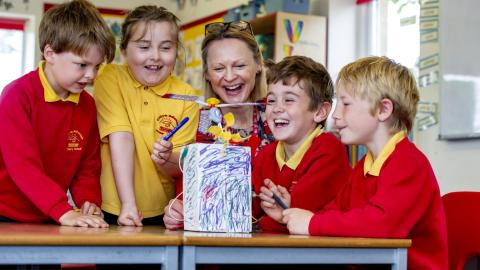Design Technology Curriculum Intent
Design and technology prepares children at Kirkby Malham Primary Schoool to take part in the development of tomorrow’s rapidly changing world. The subject encourages children to become autonomous and creative problem-solvers, both as individuals and as part of a team. It enables them to identify needs and opportunities and to respond by developing ideas, and eventually making products and systems. Through the study of design and technology they combine practical skills with an understanding of aesthetic, social and environmental issues, as well as of functions and industrial practices. This allows them to reflect on and evaluate present and past design and technology, its uses and its impacts. Design and technology helps all children to become discriminating and informed consumers and potential innovators. Children will also learn to understand and apply the principles of nutrition and learn how to cook.
Through our curriculum we want children to:
We want our children to develop:
• Significant levels of originality and the willingness to take creative risks to produce innovative ideas and prototypes.
• An excellent attitude to learning and independent working.
• The ability to use time efficiently and work constructively and productively with others.
• The ability to carry out thorough research, show initiative and ask questions to develop an exceptionally detailed knowledge of users’ needs.
• The ability to act as responsible designers and makers, working ethically, using finite materials carefully and working safely.
• A thorough knowledge of which tools, equipment and materials to use to make their products.
• The ability to apply mathematical knowledge
• The ability to manage risks exceptionally well to manufacture products safely and hygienically.
• A passion for the subject and knowledge of, up-to-date technological innovations in materials, products and systems.
Curriculum Implementation
Planning and Resources
Lesson Structure/Key Elements
Children are taught either as individuals or in groups. Skills can be ‘taught’ at the start of the lesson and then reiterated on an individual / group basis throughout the lesson. Equal opportunities are provided regardless of ability or gender. Children with special educational needs receive support from the class teacher or teaching assistant. They undertake activities geared to their level of ability and they are encouraged to take an effective and valuable role in cooperative group work.
Marking
Most feedback is done often and is oral within a lesson.
Curriculum Impact
Assessment
Learning outcomes are structured and matched appropriately for each lesson. Assessment would be measured against the criteria set for the learning outcome/endpoint which is made clear to the pupils. Assessment can then take various forms:
- Comparison with pupil’s previous work
- Discrete comparison with peers
- Pupil’s ability to select appropriate materials
- Pupil’s organisational and collaborative skills
- Pupil’s ability to respond to the visual curriculum
- Judgement of pupil’s developmental skills

